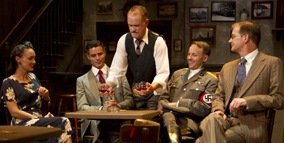HOME PAGE
SITE GUIDE
SEARCH
ADVERTISING AT CURTAINUP
REVIEWS
FEATURES
NEWS
Etcetera and
Short Term Listings
LISTINGS
Broadway
Off-Broadway
NYC Restaurants
BOOKS and CDs
OTHER PLACES
Berkshires
London
California
New Jersey
Philadelphia
Elsewhere
QUOTES
TKTS
PLAYWRIGHTS' ALBUMS
LETTERS TO EDITOR
FILM
LINKS
MISCELLANEOUS
Free Updates
Masthead
Writing for Us
A CurtainUp Los Angeles Review
Peace In Our Time
|
"London Pride means our own dear town to us." — Lyia Vivian
|

Rebecca Mozo, Daniel Bess, Josh Clark, Jason Henning, Bill Brochtrup
(Photo: Steven Brand)
|
Set in a London pub cunningly called The Shy Gazelle during the war years (1940-45), the piece betrays its age by a cast of 23, almost unthinkable in this day and age. (Although double casting has been an Antaeus practice since the company was formed in 1991, I'm listing solely the performance viewed in the production notes). The characters played are the pub's denizens and a few Nazis. The show is sprinkled with Coward tunes (as opposed to songs) as it dives into the war years. The mood and setting are abetted by John Zalewski's sound design of carefully orchestrated blasts from crashing bombs, one that made one jump in one's chair.
The pub's owners, Fred Shattuck (Josh Clark) and wife Nora (Eve Gordon) with their daughter Doris (Abby Wilde), play host to the regulars who have made the pub their second home for years. Prominently displayed front and center table are Mr. Grainger (Philip Proctor, with a superb singing voice) and Mrs. Grainger (Anna Mathias, also a fine singer).
George Bourne (Daniel Bess) remains a mystery figure until the play's end and sinister Chorley Bannister (Bill Brochtrup) with a sneer and a snarl is an undisputed villain. Ann Noble plays Alma and Rebecca Mozo as Lyia sings most of Coward's numbers in a sweet strong voice. Rebekah Tripp is Janet Braid, who flees to Cornwall but comes back to tough it out with her friends. Rob Nagle portrays Albrect Richter, the Gestapo heavy who closes the show, literally.
Coward pulls no punches when it comes to wartime atrocities. Billy Grainger (John Francis O'Brien) turns up with letters carved on his forehead by the Nazis as a deserter and Doris's tortured body is graphic. He also tells of wartime pranks, letting Mrs. Blake recount the story of a film where "Who's Afraid of the Big Bad Wolf?" is substituted for Hitler's voice.
By the time the denouement comes when Janet tells Cholly off and not long afterwards, the Gestapo descend on the pub, it's close to May 1945 so it looks as if everyone, or almost everyone will, get out in time.
With the exception of "London Pride, " the songs are not well known. They are Music Hall style ditties with clever lyrics and the piano is an authentic touch, as most pubs had them then. It's believable that after a few brews the regulars burst into song, so nothing seems out of place.
Casey Stangl performed the mammouth task of directing two casts with shrewdness and grace on the small stage of the Antaeus at the Deaf West Theatre. Barry Creyton's adaptation tightens the play and gives it a gleaming whole.
A bravo for Tom Buderwitz's truly splenid scenic design which catches the pub from carved ceiling to pictures to fine details. And thanks to Noel Coward for taking time off from musicals to give us this!
|
Title: Peace In Out Time Playwright/Composer: Noel Coward Director: Casey Stangl Adapter: Barry Creyton Cast: Archie (piano player), John Allee; Lyia (Rebecca Mozo); Fred Shattuck (Josh Clark); Mr. Grainger (Philip Proctor); Nora Shattuck (Eve Gordon); Mrs. Grainger (Anna Mathias); George Bourne (Daniel Bess); Chorley Bannister (Bill Brochtrup); Doris Shattuck (Abby Wilde), Alfie Blake (Buck Zachary), Lily Blake (Karianne Flaathen), Alma (Ann Noble), Janet Braid (Rebekah Tripp), Albrect Richter (Rob Nagle), Phyllis Mere (Rosalyn Mitchell), Bobby Paxton/Gestapo (Paul Culos), Gladys Mott (Belen Greene), Soldier (Chris Clowers), Kurt Foster/Gestapo (Patrick Wenk-Wolff), Billy Grainger (John Francis O'Brien), Dr. Venning (Mark Doerr), Stevie Shattuck (Brian Tichnell), Mrs. Massiter (Melinda Peterson). When: Oct. 20-Dec. 11, 2011 Where: The Antaeus Company @ Deaf West Theatre, 5112 Lankershim Blvd., North Hollywood. Reservations: (818) 506-1983. Reviewed by Laura Hitchcock on Oct. 21. SONG LIST London Pride - Lyia Don't Let's Be Beastly to the Germans - Fred Most of Every Day - Lyia Let's Live Dangerously - Chorley, Bobby, Gladys London Is A Little Bit of All Right - Mr. Grainger Where Are The Songs We Sung? - Mr. & Mrs. Grainger Could You Please Oblige Us With A Bren Gun? - Fred That Is The End Of The News - Archie Come The Wild, Wild Weather - Lyia London Pride (Reprise) - Cast |
|
Subscribe to our FREE email updates with a note from editor Elyse Sommer about additions to the website -- with main page hot links to the latest features posted at our numerous locations. To subscribe,
E-mail:  esommer@curtainup.comesommer@curtainup.com esommer@curtainup.comesommer@curtainup.comput SUBSCRIBE CURTAINUP EMAIL UPDATE in the subject line and your full name and email address in the body of the message -- if you can spare a minute, tell us how you came to CurtainUp and from what part of the country. Visit Curtainup's Blog Annex For a feed to reviews and features as they are posted add http://curtainupnewlinks.blogspot.com to your reader Curtainup at Facebook . . . Curtainup at Twitter REVIEW FEEDBACK Highlight one of the responses below and click "copy" or"CTRL+C"
Paste the highlighted text into the subject line (CTRL+ V): Feel free to add detailed comments in the body of the email. . .also the names and emails of any friends to whom you'd like us to forward a copy of this review. |



